"We're not here by choice. We cannot control the course of our moon. We're looking for a place to live. We won't use force. All we want is peace."
-Dr. Helena Russell-
"You have no future. You carry with you the seeds of your own destruction. You are a contaminating organism--a fatal virus, a plague of fear."
-Alien-
"Ever since we were blasted away from Earth we've been fighting for survival. We have survived. Now how I don't know. There's no rational explanation. But what I do have is an absolute faith in the strength of the human spirit and the belief that someone or something is looking after us, God if you like. And we will survive."
-Commander John Koenig-
"Come and seek us out... if we still exist. Come and teach us all you know, because we have learned many things, but most of all we have learned... that we still have much to learn."
-Professor Victor Bergman-
Far and few between to be sure, but yes a FAB FRIDAY just the same!
I had been anxious to return to an episode of Space:1999. The appropriately dubbed Space:1999, Year One, Episode 17, War Games, opened with about as much action-packed Eagle excitement as any pre-pubescent kid of the 1970s could dream. The Eagle takes centerstage in the episode with about as much screen time as any episode has allotted to date.
Fans of Brian Johnson's Eagle design are treated to a host of Eagle craft not least of which was the Mark 9 Hawk Warship model (finally seeing a diecast release by Sixteen Candles in 2021). The CGI-free model work and string/cable-based (yes, on Blu-Ray you can see those ever-present strings clear as the day is long, but it does not detract) action is a sight to behold if a bit too vintage for some of today's science fiction viewers. Nevertheless, for those with an appreciation for artisans and classic science fiction, War Games offers plenty of model work and set and production design efforts that even today's budget-heavy works would have difficulty rivalling. Much of the work is detailed, in gloriously restored full-color for Blu-Ray with endless imagination. Gerry Anderson tapped into something special even if it wasn't fully appreciated upon its initial release beyond the critics envy of the series' budgetary numbers.
Alongside modeler Brian Johnson and production designer Keith Wilson (just look at the images of the wondrous shots from War Games to behold their work), War Games is gifted with a script by Space:1999 Year One mainstay Christopher Penfold (involved in the writing of eight entries in the series) and direction from Space:1999 journeyman Charles Crichton (A Fish Called Wanda). Both Penfold and Crichton worked together on Guardian Of Piri, starring a pre-established, Maya-free Catherine Schell, The Last Sunset, Space Brain and Dragon's Domain. Crichton directed fourteen entries in all for the series.
War Games offers a good deal of dramatic interplay and heft by the many characters in the series working as a solid ensemble piece. Ziena Merton, Nick Tate and others receive considerable screen time. War Games is also witness to some of the most destruction set evidence in a single episode of the series to date. Moonbase Alpha is seemingly annihilated throughout the first part of the story. The episode even experiences the loss of a significant recurring minor character from medical or does it?
Following the action infused first half of War Games, the entry ironically returns to what Space:1999 always did best, present a show of ideas and concepts for humanity lost. Some of the evidence of the thoughtful script can be seen above.
The remainder of the episode becomes this writer's favorite part of War Games asking questions of human fallibility, human error, placing a mirror to man's fears by examining the wisdom of entering into a decision of war.
On a purely science fiction level Penfold delivers a beautiful script that is at once exciting, but exquisitely penned with pensive ideas on the imperfections of humankind.
On its face, the Alphans arrive at a planet guarded by a race of beings of great intellect who have eradicated fear and see humanity (the space invaders in this case) arriving as a plague to the inevitable destruction of their peaceful world.
The script is eloquent in presenting the concepts but not spoon-feeding the audience its truly beautiful story of human reflection. It wonderfully inverts many of the alien invasion concepts.
In the end, Dr. Russell has glimpsed their world. This world without fear she calls beautiful, but sadly suggests humanity has lost that inner beauty by contrast.
Once again, War Games packs a lot into its story conceptually, but is still a powerful story of rumination today---one of those timeless exercises in intelligent science fiction.
War Games tricks us into a belief this is a simple exercise in Gerry Anderson modelling and pyrotechnic action (a la Thunderbirds), but then turns the tables creating a truly human story that is at once philosophical and existential with meaty roles and special moments for the entire cast. Martin Landau, Barbara Bain, Barry Morse, Ziena Merton all have their moments to shine. War Games is precisely the kind of science fiction that proves Anderson and company didn't deserve the harsh criticism it received in the 1970s.
War Games is filled with all of the quiet, spacious and thought-provoking ideas that make it yet anther strong entry in forever underrated Year One. In LOST (2004-2010), John Locke represented a position of faith while Jack Shephard offered us a vantage of science on events throughout six dramatically-charged and gripping seasons of the series. Well, Space:1999 often exercises two sides of the same coin, the unreliability of science and the imperfection of human decision versus the belief in something much greater, faith and God. The mysteries and unknowns of space positioned Alphans to constantly balance human understanding through science and knowledge against more philosophical leaps of faith into the void. Koenig (here revealed to be the ninth commander of Moonbase Alpha unless just a part of the dream) and Bergman often challenged us in those arenas believing their fate lay beyond the actions of man. Penfold's challenging, even poetic, script is quite brilliant in this regard. It's easy to see why Penfold considers it his best work on the series. It's arguably one of his best.
Reflecting on the entry, this writer couldn't help but recognize that he too was aging in this life more than ever by realizing the show had lost many including Landau, Morse, Merton, Wilson, Crichton as well as Gerry and Sylvia Anderson. Only a few remain.
So many in the series had invested their talents and voices into something that was sorely underappreciated and still is, but whose influence and remembrance continues.
Anyone who enjoyed 1970s cinema and television would be hard pressed to not look at Space:1999 as one of the intelligent best from that period. The series asked questions and posed many moments of self-examination at a time that didn't necessarily require it. There is indeed a certain darkness, isolation, mystery and loneliness to Space:1999 and War Games captures so much of what worked so well in that series.
War Games: A. Writer: Christopher Penfold. Director: Charles Crichton.
Additional commentary:
Author John Kenneth Muir called the episode "the most visually spectacular science fiction television episode in the history of the medium" in his book Exploring Space:1999 and he's not wrong to level such a compliment. It is stunning and as he notes could have easily held up against some sci-fi productions straight through the 1990s in terms of effects and production magic. This initial assessment made it all the more bewildering to find he placed War Games in the category of "mediocre." Why? Only because my love of the episode increased more in terms of the human components found in the second half, Let's investigate.
Muir and I would part company on the rendering of the remainder of War Games. He felt the rest of the episode had "little to recommend it." I wonder if Muir would feel differently regarding War Games all these years later or still feel the same? He dubs the episode "confusing" and "non-sensical." Truly Muir is a great writer and it's always hard to rail against his points. I would argue that War Games provides just enough pieces of the puzzle to allow the viewer to assemble its message on human fallibility and the question of fear and how it indeed impacts human decision and drives humankind alongside love.
Muir makes some terrific arguments about the logic of the nightmare/dream the aliens force upon the Alphans to explore human frailty and does indeed have problems with it. Still, it is the Alphans' nightmare and however odd or unusual some elements may be within War Games such as the use of Earth-based Hawk IX warships it is all manifested from the human mind and could stand to reason. After all when have dreams or nightmares ever been completely logical? Again, there is enough in play that makes the story work through to its dénouement.
Muir asks good questions about the aliens' intentions in foisting this test upon the Alphans and it is a test. Muir suggests the aliens were in turn acting out of fear, but the beings indeed possess a higher intelligence that suggests they already know the humans act out of a combination of reason and emotion. They seem to understand what they would indeed bring to their peaceful world. Knowing what the humans are capable of they force them to look in the mirror at themselves in an attempt to prevent them from coming. The aliens also give the Alphans a chance to see what could be if they indeed make a choice not out of fear. This is a gift to humanity, but they are still not welcomed for the evolution of humans as intelligent beings is indeed primitive by comparison and arguably in its infancy.
Muir asks why the aliens would welcome Dr. Helena Russell into their collective hive brain mentality given the flaws of humanity. One could argue, again, the aliens were presenting the Alphans with a look at what is possible utilizing Helena as a vessel. Given the intellect of the aliens what they were doing with Helena and the Alphans was in effect a foregone conclusion. Could it be they knew the outcome for the Alphans? They were in control throughout the encounter. Helena was indeed welcomed within the alien dream and humanity as Bergman notes is left to "learn" the many mysteries of space.
In fact, the extreme reaction in the dream regarding Koenig's second decisive move toward violence yet again seems to underscore the damage of such a decision and thus Koenig is provided a chance to retry the fateful decision. When he does the Alphans don’t make the same mistake twice. In effect, the Alphans “learn” as Bergman ruminated demonstrating humanity is indeed capable of change. In our real lives, whether it chooses to do so, based on all evidence since the making of this series, remains to be seen.
This writer too was not frightened by the episode as Muir suggested it should have been more "frightening," but I was entranced by the story and the writing. Throughout the second half I had literally forgotten I was attempting to blog. I was that engrossed.
Muir finds War Games expects a lot of the viewer as he sees the writing question the logic in motivation and stretch credulity even resolving its story with the art of illusion calling the dream a "dramatic cheat." Muir finds the dream element to be a bit too convenient. This is often a convenient construct, and if so is not the application of the illusion in War Games not completely original in nearly every element of its plotting? It worked for me in delivering its themes. Unlike Muir who found some points of the story to be the result of "poor writing" I quite enjoyed Penfold's script and found it to be a terrific entry in the series growing stronger as the episode progressed.
Interestingly, Muir makes a comparison of the entry to Black Sun (Y1, E3), another he lists as simply mediocre, and yet another episode this writer held in much higher regard along with War Games. Did the philosophical underpinnings of these two entries supersede the internal flaws within the episodes and ultimately speak to this writer in a way that didn't work for author Muir? There is indeed an emotional resonance and impact within these atmospheric mystery pieces that have an impact on this viewer. I recall a conversation with Mr. Muir where he had a change of heart toward Black Sun all these years later if I'm not mistaken. The same could hold true for War Games. Still, this writer always enjoys his analysis and the logic of his breakdowns rarely fails. I'm grateful to read intelligent analysis that allows for a counterpoint or conversation within the genre.
SciFiNow gave Black Sun a roughly similar rating as Mr. Muir and War Games a roughly similar rendering as me creating a split view on the two stories for that publication.
One thing is certain, any story, even those I've visited could result in a very different takeaway with time. That's the special thing about a series like Space:1999. These little episodic stories and works of art are ripe for reinterpretation and revisits time and again. There is so much to explore here.
Ultimately, for me, War Games and Black Sun, would easily find a placement within Muir's excellent category. These are two outstanding pieces of science fiction that still hold up extremely well all these years later for fans of science fiction.



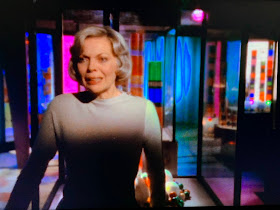








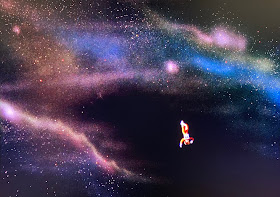



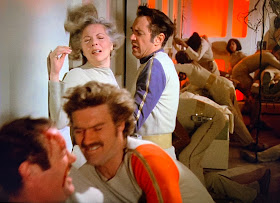




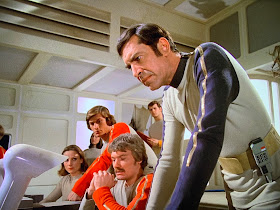

















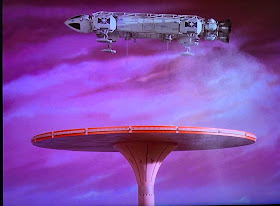
















Any word on the hinted reboot that I read was going to be called "Space 2099"? The only other info I had was that it was going to take place on a space station--called Alpha and would involve an experimental hyperdrive or wormhole generator.
ReplyDeleteSadly BB not a peep! Updates from anyone visiting welcomed.
ReplyDeleteHey SFF! Thanks again for another great 1999 review!
ReplyDeleteI think I first discovered Space: 1999 with the original airing of season 2 "The Immunity Syndrome" on our local (Denver) CBS channel. However, there was a skeleton in that episode that scared my 8 year old mind so much I never really revisited 1999 in its original run! In the late 70's I picked up the hugely influential book Fantastic Television but man! The author Gerani slammed Space:1999! Still, I had an episode guide with that volume but I would not see the show until about 2002? when my neighbor had a DVD set 3 and let me borrow it. I was hooked! Picked up that one and the other 7 sets and still watch them every few years. Should probably pick it up in blu. Was watching Death's Other Dominion when I ran across your most recent review! War Games is great as is many of the episodes in season 1! I like season two just not as much as season 1. I have Muir's book and the Destination: Moonbase Alpha book. Prefer your assessments to Muir's! Thanks again and look forward to more reviews of the underrated Space:1999!
Thanks so much for the kind words. I think you're living proof to all of those arguments we make here that the show held up all those years later. You along with myself and many others consistently return to the series. Thank you for writing. Happy Holidays.
ReplyDelete